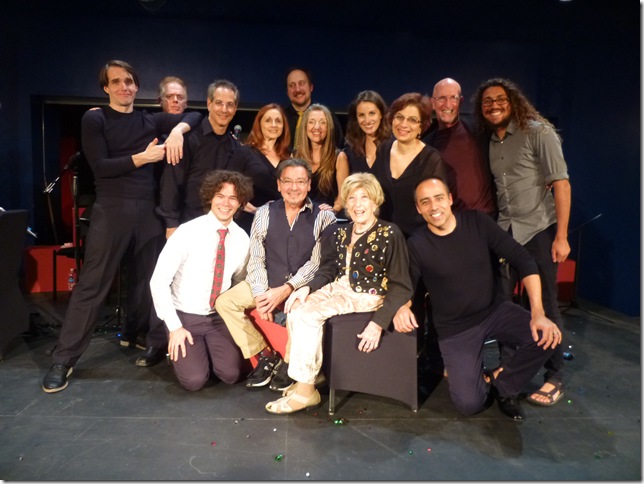By Dale King
Prolific absurdist playwright Eugène Ionesco didn’t like Ionescopade, A Musical Vaudeville, when first he saw it.
Mildred Kayden, who wrote the music and lyrics for what she herself deemed “a very strange play,” said the Romanian-born, French-raised author swore he would never speak English again because the absurd musical raised his own absurdity to an even higher level of absurdity — if you can follow that.
The Theatre Lab at Florida Atlantic University in Boca Raton presented the Ionesco sendup, conceived and written by Robert Allan Ackerman, on a recent Saturday evening and Sunday afternoon. The audience packed into the chilly, makeshift theater in stately Parliament Hall on the Boca campus received the play with genuine laughs and no small measure of amazement.
This reaction apparently amazed Kayden, who was sitting in the front row. Like many former New Yorkers, she has relocated — with her boxes and boxes of musical scores — to Boca Raton. “I can’t tell you how surprised I am that this company did this so well,” she said during a post-show discussion with cast, crew and gallery.
Also on hand was Bill Castellino, who joined Ionescopade as its director and choreographer in 1980 and has stayed with it. Theater Lab director Lou Tyrrell, who launched the experimental theatrical effort on the FAU campus last September, was also present.
Ackerman, who met Kayden in a New York City drama bookstore in the early 1970s, asked her to write a couple of songs for his odd Ionesco piece. She ended up concocting the full score for the show that simmered in Off-Off-Broadway theaters for a while until the New York Times gave it a glowing review. From then on, the crazed Ionesco musical has gone worldwide.
Ionescopade blends original dialogues and monologues from the author’s plays (The Killer, The Leader, among others) with re-imagined song and dance routines inspired by some of his personal journals. Kayden’s songs have a keyboard-tickling sound that adds to the overall incongruity.
One of Kayden’s melodies tells about a fanatically worshipped leader who, in fact, is missing his head. An enthusiastic song called “The Best Is Yet to Be,” performed with confidence and glee, eventually collapses into a whimper. The vocal, “Fire,” adapted from a passage in Ionesco’s The Bald Soprano, talks about all manner of things catching fire — Boy Scouts, birds, fish — even fire catches fire. And finally, the singer says, “The whole world caught fire.”
Ensemble performers who did a really terrific job on the Theatre Lab stage included Irene Adjan, Clay Cartland, Jeni Hacker, Frank Licari, Alix Paige and Barry Tarallo. Jordon Armstrong played the Little Man and Ross Frawley read stage directions — an important task in this show. Musical director Caryn Fantel played piano and Roy Fantel was the drummer/percussionist.
Ionescopade features alternating serious and humorous sketches, some 20 rapid-fire shorts in all. One of the funnier skits features a family of six entertainers, all of them named Bobby Watson, and each singing a song in their mini-vaudevillian turn. From this sketch comes such songs as “My Ginger Wildcat,” a childlike tune about an adored cat who is killed by a dog.
Another skit brings the full ensemble to their feet, and while they are singing, each one drops “dead” when Frawley commands, “Drop!”
Commenting on this sketch later, Tyrrell said the actors “are not really dead. They are dying of other things that we die for every day, like dying of a broken heart. This sheds an interesting light on the fake death that we do to ourselves every minute of every day.”
A skit called “The Peace Conference” may have seemed crazy in Ionesco’s time — he died in 1994. But in 2016 parlance, its basically ludicrous nature comes across as no more ridiculous than your average meeting of the United Nations Security Council, negotiations about the Iran nuclear agreement or a presidential debate.
“Frenzy for Two,” for its absurdity, has a 21st-century message. In this skit, two people are hiding under a bed while a war is raging. Suddenly, all is quiet. “Peace has been declared.” And the pair is frightened because they have never lived in a world at peace — only at war. “The upside-down-ness of this passage is chilling,” said director Castellino.
Tyrrell summed up Ionescopade: “Humanity is basically not perfect. For me, that’s the whole theme of the play. It’s not a perfect world, though we aspire to it. It’s like the song Irene [Adjan] sings. What do you do between living and dying? Well, what do you do? Living, I hope.”
For a full schedule and more information about the Theatre Lab at FAU, call 561-297-4784, email theatrelab@fau.edu or visit www.fau.edu/theatrelab.
